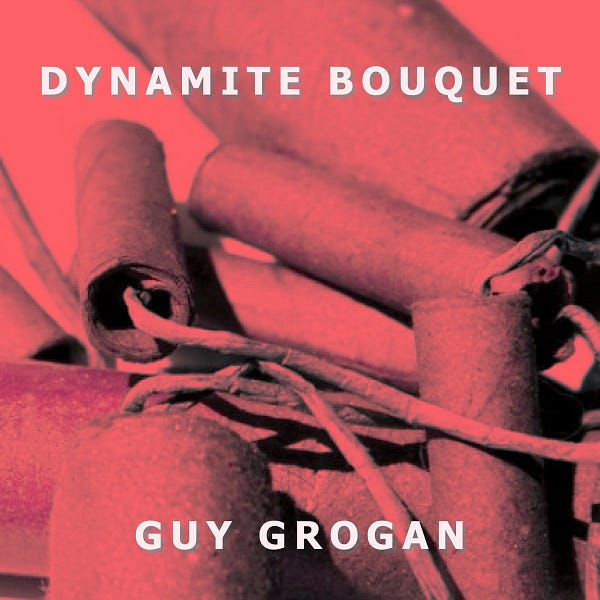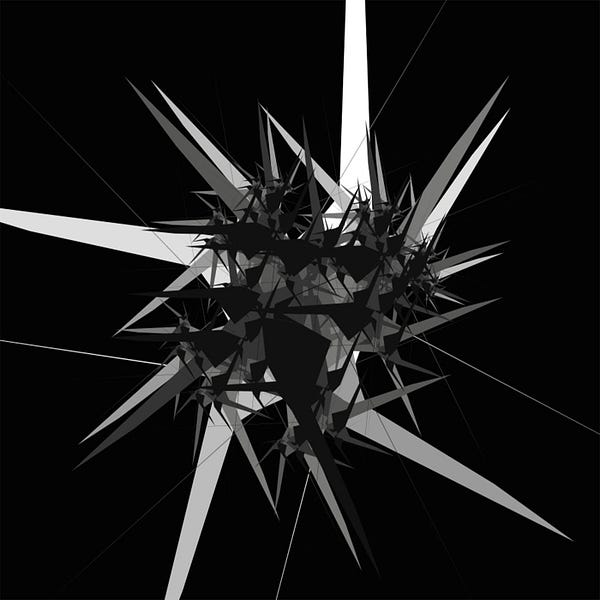 |
| DYNAMITE BOUQUET - Guy Grogan |
Guy Grogan is an established presence on the alt-rock terrain, someone who confesses his sins without fashioning a persona of being either saint or sinner. For all the hurt , malice, lurid joy and occasional bits of humanity and kindness this fellow chooses to write songs about with his hook-driven genius, Grogan is the common guy, the everyman, the guy in the bar you see at the daily happy hour, or the dude you espy daily at the bus stop at the same time each instance, going somewhere, with things to do. His music conveys the stories of a regular Joe with tunes that are simple but melodic, guitars that rock but don’t bludgeon, lyrics that let it all hang out without creating earache .”My Own Way Out”, a medium rocker from his new album Dynamite Bouquet, commences with a killer power chords, is the testament of a man giving voice to a feeling that he’s trapped in a conspiracy he is only vaguely aware of:
hey you come down from there when you feel like you’ve made despair come true sometimes I don’t much care for me sometimes I decide to leave me be
Their pronouns change, from “you” to “I”, and there is the mystery of who Grogan’s is talking about; I’m in favor of thinking that he keeps his practice to everyday speech and uses the altering references as interchangeable ways of the narrator talking about himself. It feels natural, it feels un-strained, confused but not cluttered, startling in its brevity. With a voice residing somewhere between the nasal croon of Elvis Costello and the soulful braying of Tom Petty, his tunes are not guitar bashes alone, revealed in “River Like a Cry”, a ballad surmising the end of an affair that has gone deep to the bone, the moment of realization that any chance of reconciliation is passed , that all that remains for the parting couple is to
let it go with the river let it go like a cry you tell me when we will wither i tell you when we will die.
This does approach the bittersweet pleasures Costello composes, but where Costello lyrically extends beyond his established talent at poeticizing miserable experiences and giving listeners a collision of competing metaphors and similes(some brilliant, some not so good), Grogan’s spare evocations make the telling more vivid, more heartfelt, and there is the feeling this serves to create the underlying idea that life goes on, one pushes on , one is not done experiencing the joy and heartache that is their birthright.An intriguing songsmith, Grogan is providing an album’s worth of tunes in a variety of styles that sweetly and succinctly reveals his weaknesses and strengths and the hard-won humor a songwriter who remains in the trenches with the rest of us. Dynamite Bouquet stands apart from most others in the genre that is full of songwriters who make their music unlistenable, in large measure, by theatricality they bring to their emotions. Grogan is more in the Hemingway school, a man with the knack for the terse summation, the toughness of getting on with it. The feelings go deep and still, life goes on and still, Guy Grogan continues to rock it as hard as he needs to. He makes his awkward phrasing and his mulling equivocation over emotional hot buttons whose loathsome pangs don't abate into something endearing; this is the unique combination of a songwriter who tersely combines a worldview of permanent ambivalence with a guitar rock that contrarily makes you feel that he'll get over his agonies and conundrums stronger but wiser. Waiting for that too happen has often enough a sore point with artists who begin intriguingly as poets of post-college emotional shapelessness but, over time, evidence arrested development thematically as they grow older and release.
For the time being, Groder's situation lures you in because of the compelling grind of his brand of guitar rock. Will he age into a new Neil Young, who has used his advanced age to bring out a subtler worldview while still producing some of the grungiest electric guitar of this and the last century, or will Grogan be the newest 60-year-old teenager still moping about lost love decades after it happened? Stay tuned, and in the meantime enjoy this spikey set of condensed, 4/4 mood pieces.





